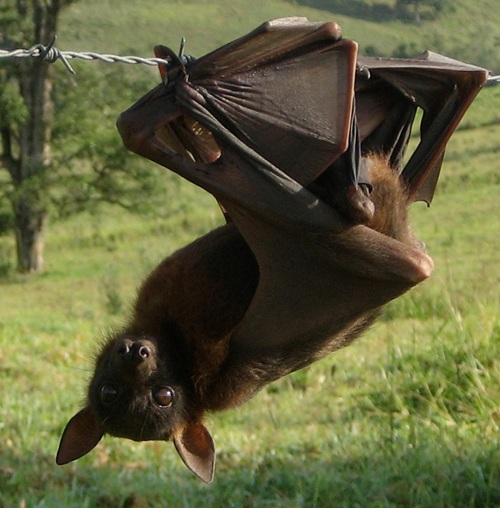WILDLIFE-FRIENDLY FENCING SAVES LIVES
LITTLE RED BATS DYING ON FENCES
OCTOBER 2025
More than 200 little red bats have been badly injured on barbed wire fences in recent windy weather. Wildlife carers rescued them over three days and, sadly, many had to be euthanised.
The little red bats were caught on barbed wire fences in the Tumoulin, Gillies Highway, East Palmerston and Mareeba areas.
“Some of the fences were on ridgelines. The bats were trying to keep low, and out of the wind, and they smashed into fences,’’ Jenny from Tolga Bat Hospital says. “Tumoulin near Ravenshoe is a real hotspot.”
Important pollinators of native tree species
These bats are roosting through the day in the Tolga Scrub. Little reds are the smallest flying fox in Far North Queensland. They mainly eat blossom and nectar from native trees and can travel 20 to 30km a night in search of food. They are important pollinators of native tree species, usually staying in one roost for four to eight weeks and then moving on.
Plain top wires on fences save lives
Seeing so many little reds tangled up in barbed wire has wildlife carers again talking up the importance of plain wire as the top wire in fences. The top wire of fences cause 86 per cent of entrapments.
“Swapping to plain wire saves lives – for bats and other native animals like owls and gliders,’’ Jenny says.
“Tolga Bat Hospital has been running a wildlife-friendly fencing project since 2006. It’s impossible to do nothing when you witness the suffering and loss of life from barbed wire fences in hotspot areas.”
Terrain NRM’s Tony O’Malley says landholders are adopting new solutions, including a more visible twisted plain wire, that minimise risks to wildlife while still being effective for farming.
“We have a new factsheet with a range of options – whether you’re putting in new fences or maintaining existing fences.
“Top strand options include barbless double-strand twisted wire (barbed wire without barbs) or plain wire.”

How you can help
• If you own a farm or property: Look into wildlife friendly fencing to help prevent entanglements.
• Report sick, injured, or dead bats to FNQ Wildlife Rescue on (07) 4053 4467. (Avoid touching them)
Terrain NRM’s work in this area is part of its Forest Resilience project, funded by the Australian Government’s Saving Native Species program. The Tolga Scrub and Tumoulin are Mabi Forest and Wet sclerophyll forest respectively, which are some of the most threatened ecological communities in the Wet Tropics region.
RELATED NEWS
Bats in Your Backyard
 admin@terrain
admin@terrain
 January 15, 2026
January 15, 2026
Green Connections
 admin@terrain
admin@terrain
 January 15, 2026
January 15, 2026
Tradition & Tech Team Up
 admin@terrain
admin@terrain
 December 15, 2025
December 15, 2025






























